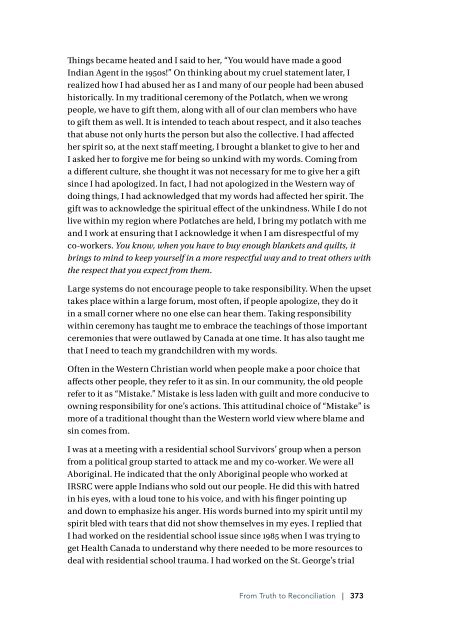Maggie Hodgson - Speaking My Truth
Maggie Hodgson - Speaking My Truth
Maggie Hodgson - Speaking My Truth
You also want an ePaper? Increase the reach of your titles
YUMPU automatically turns print PDFs into web optimized ePapers that Google loves.
Things became heated and I said to her, “You would have made a good<br />
Indian Agent in the 1950s!” On thinking about my cruel statement later, I<br />
realized how I had abused her as I and many of our people had been abused<br />
historically. In my traditional ceremony of the Potlatch, when we wrong<br />
people, we have to gift them, along with all of our clan members who have<br />
to gift them as well. It is intended to teach about respect, and it also teaches<br />
that abuse not only hurts the person but also the collective. I had affected<br />
her spirit so, at the next staff meeting, I brought a blanket to give to her and<br />
I asked her to forgive me for being so unkind with my words. Coming from<br />
a different culture, she thought it was not necessary for me to give her a gift<br />
since I had apologized. In fact, I had not apologized in the Western way of<br />
doing things, I had acknowledged that my words had affected her spirit. The<br />
gift was to acknowledge the spiritual effect of the unkindness. While I do not<br />
live within my region where Potlatches are held, I bring my potlatch with me<br />
and I work at ensuring that I acknowledge it when I am disrespectful of my<br />
co-workers. You know, when you have to buy enough blankets and quilts, it<br />
brings to mind to keep yourself in a more respectful way and to treat others with<br />
the respect that you expect from them.<br />
Large systems do not encourage people to take responsibility. When the upset<br />
takes place within a large forum, most often, if people apologize, they do it<br />
in a small corner where no one else can hear them. Taking responsibility<br />
within ceremony has taught me to embrace the teachings of those important<br />
ceremonies that were outlawed by Canada at one time. It has also taught me<br />
that I need to teach my grandchildren with my words.<br />
Often in the Western Christian world when people make a poor choice that<br />
affects other people, they refer to it as sin. In our community, the old people<br />
refer to it as “Mistake.” Mistake is less laden with guilt and more conducive to<br />
owning responsibility for one’s actions. This attitudinal choice of “Mistake” is<br />
more of a traditional thought than the Western world view where blame and<br />
sin comes from.<br />
I was at a meeting with a residential school Survivors’ group when a person<br />
from a political group started to attack me and my co-worker. We were all<br />
Aboriginal. He indicated that the only Aboriginal people who worked at<br />
IRSRC were apple Indians who sold out our people. He did this with hatred<br />
in his eyes, with a loud tone to his voice, and with his finger pointing up<br />
and down to emphasize his anger. His words burned into my spirit until my<br />
spirit bled with tears that did not show themselves in my eyes. I replied that<br />
I had worked on the residential school issue since 1985 when I was trying to<br />
get Health Canada to understand why there needed to be more resources to<br />
deal with residential school trauma. I had worked on the St. George’s trial<br />
From <strong>Truth</strong> to Reconciliation | 373

















